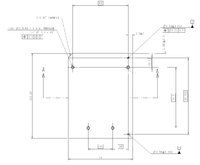Difference between revisions of "Talos II/Mechanical Specifications"
(Created page with "== CPU Retention System == The Talos II uses IBM's proprietary high-pressure CPU retention mechanism. This design is available for OpenPOWER members to use, but remains licen...") |
|||
| (2 intermediate revisions by one other user not shown) | |||
| Line 8: | Line 8: | ||
A reusable base plate assembly is used to secure the upper load frame of the IBM retention system to the PCB. The load frame is secured with four Torx T15 M3.5 screws; care must be taken not to either over-tighten these screws or to leave them loose enough that they may back out over time. Modifications to the retention mechanism that cause damage to the mainboard or other components will void any warranty on the affected parts. | A reusable base plate assembly is used to secure the upper load frame of the IBM retention system to the PCB. The load frame is secured with four Torx T15 M3.5 screws; care must be taken not to either over-tighten these screws or to leave them loose enough that they may back out over time. Modifications to the retention mechanism that cause damage to the mainboard or other components will void any warranty on the affected parts. | ||
| − | == | + | == Reference Designator Map == |
| + | |||
| + | === PCB Revision 1.00 === | ||
| + | * [[:File:Talos_II_PCB_revision_1.00_component_locations_top.pdf|Top Side]] | ||
| + | * [[:File:Talos_II_PCB_revision_1.00_component_locations_bottom.pdf|Bottom Side]] | ||
Latest revision as of 13:20, 2 March 2019
CPU Retention System
The Talos II uses IBM's proprietary high-pressure CPU retention mechanism. This design is available for OpenPOWER members to use, but remains licensed. The heatsinks apply significant, even pressure to the CPU to ensure that all pins on the LGA make contact -- traditional edge-based retention mechanisms could leave pins near the middle of the package with poor or no contact.
Base Plate
A reusable base plate assembly is used to secure the upper load frame of the IBM retention system to the PCB. The load frame is secured with four Torx T15 M3.5 screws; care must be taken not to either over-tighten these screws or to leave them loose enough that they may back out over time. Modifications to the retention mechanism that cause damage to the mainboard or other components will void any warranty on the affected parts.
